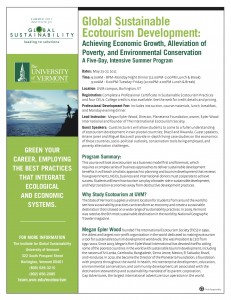Megan Epler Wood, the founder of The International Ecotourism Society (TIES), and Director of the Planeterra Foundation will teach, Global Sustainable Ecotourism Development, at the University of Vermont, May 23-27, 2011.
For the last 21 years, ecotourism has emerged as one of the most dynamic and discussed tools for sustainable development. In the last 10 years, the field has been much enriched by a wide array of disciplines, particularly economic development and social/pro-poor development techniques. Ecotourism is now broadly and appropriately applied as a rural economic and sustainable development tool. Its successful application is based on a set of methodologies that all students and development practitioners require to be successful.
Students attending Global Sustainable Ecotourism Development will learn new, more sensitive field based approaches that rely on a broader set of academic expertise and disciplines than associated with the topic in the past. It will help students to understand how tourism can play a broader role in sustainable development, and help transition economies away from destructive development practices.
 In 2011, students will be provided with in-depth social, political and economic analysis of two of the world’s most important ecotourism destinations, Brazil and Rwanda. Students will learn how ecotourism is interlinked with the economics, socio-political outlook, conservation tools, and poverty alleviation challenges for these two emerging nations.
In 2011, students will be provided with in-depth social, political and economic analysis of two of the world’s most important ecotourism destinations, Brazil and Rwanda. Students will learn how ecotourism is interlinked with the economics, socio-political outlook, conservation tools, and poverty alleviation challenges for these two emerging nations.
Guest instructor, Ariane Janer, a consultant in sustainable development since 1996, will bring over 20 years of experience developing the ecotourism economy of Brazil and discuss the unique challenges the country now faces preparing for both the 2012 Olympic Games and the World Cup in 2013. One of the founders of the Brazilian Ecotourism Society, EcoBrasil (1993), Janer has been involved in major projects such as Funbio's Best Practices in Ecotourism Program and the Brazil Sustainable Tourism Program.
Guest instructor, Miguel Baca will provide an in-depth living case study of how ecotourism has evolved and is presently developing in Rwanda. Over the last 14 years, he has helped a wide variety of international, public, and private organizations design and implement tourism product development programs, strategic and operational marketing plans, certification systems, and business development programs for the tourism industry that are community-based and/or oriented toward small and medium-sized enterprises (SMEs). He has extensive experience conducting supply and demand analyses for the tourism industry and creating market-specific products. He has consulting experience in diverse cultural settings and countries, including Guatemala, Belize, El Salvador, Mexico, Honduras, Haiti, Jamaica, Dominica, Barbados, Surinam, Peru, Uruguay, Jordan, Egypt, Italy, Rwanda, Indonesia, New Zealand, and the United States. Baca holds a certificate in Tourism Marketing Planning from Cornell University, a M.A. degree in International Development Policy from Syracuse University, and a bachelor's degree in History from the Universidad Católica del Perú. In addition to his native Spanish, he is fluent in English, French, and Portuguese.
This 5-day intensive seminar will be held on the University of Vermont campus as a professional certificate program, or for three college credits. Fees depend on the enrollment option selected. All information on the course can be found on the University of Vermont website
at http://learn.uvm.edu/ecotourism. Accommodations on campus can be acquired in a LEED certified facility for a modest fee. Off campus housing also includes "green housing" options.
The State of Vermont supplies a vibrant location for students from around the world to see how sustainability practices can transform an economy and create a sustainable destination that is based on a wide range of sustainability practices. A case study on the development of ecotourism in Isle La Motte, Vermont, will be featured this year with guest instructor, David Kestenbaum of University of Vermont.
Megan Epler Wood founded The International Ecotourism Society (TIES) in 1990, the oldest and largest non-profit organization in the world dedicated to making ecotourism a tool for sustainable tourism development worldwide. She was President & CEO from 1991-2002. Since 2003, Megan’s firm EplerWood International has devoted itself to aiding some of the poorest countries in the world with sustainable tourism development; including the nations of Sri Lanka, Cambodia, Bangladesh, Sierra Leone, Mexico, El Salvador, Brazil, Belize, and Honduras.
In late 2010, Megan became the Director of the Planeterra Foundation, a foundation with projects throughout the world in health, microenterprise development, education, environmental conservation, and community development; all associated with the destination stewardship and sustainability mandate of its parent corporation, Gap Adventures, the largest, independent, international adventure tour operation in the world.
One of Epler Wood’s most well-known published works is Ecotourism: Principles, Practices and Policies for Sustainability for UNEP in 2002. She has lectured at Columbia Business School, Harvard University, Wellesley, Duke University, University of Vermont, and The George Washington University. She was named a Senior Fellow at the Institute at the Golden Gate in 2010 where she is developing next generation thinking on the development of tourism as a sustainable economic development tool in collaboration with leading universities, NGOs, and business professionals.
She is presently leading an intensive study at Cornell’s Johnson School, sponsored by Planeterra and the Belize tourism Board, to create better tools for governmental decision making on destination stewardship.
